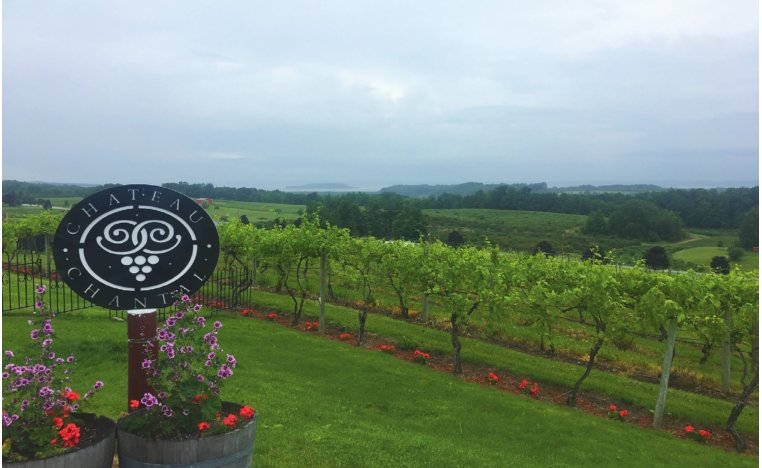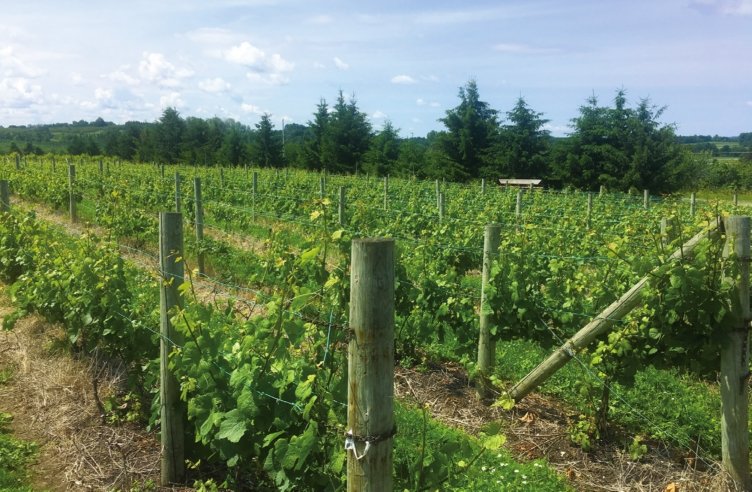 An overview of the best wine stops in the state
An overview of the best wine stops in the stateGrowing wine grapes can be a harrowing line of work. Sure, all may be quiet on a calm, 82-degree day in July. But nature has its way of reminding every wine grower who’s in charge (hint: it’s not them). 
 All of these issues have affected various important wine regions in the last decade: hail, flash floods, forest fires, drought, fruit flies, lack of sun, and of course Michigan’s kryptonite: frost.

The 2014 and 2015 Michigan grape harvests were both decimated by frost. Sure, we may love those 65 degree days in March, but if they extend for too long, and are backed up by an overnight low of 25, any vines that have achieved some growth are in deep trouble of losing their fruit for the year. 
 Many vineyards saw as much as 95% of their fruit lost. Obviously, this was a problem. 
 Many wineries purchased grapes or unfermented grape must from Washington state (and most, but not all wineries, were forthright with the public on what wine was from Michigan, and what wine was not). Many wineries also diversified into distillation or cider production.
 Thankfully, 2016 was a banner harvest for Michigan, with minimal problems. So far, 2017 is looking quite nice, but every vintner has deep concern that lack of sun, warmth, or calm weather could impede the quality of the grapes. 
 The best news is that many 2016 wines are already on the market, and Michigan wineries are in peak tourism season. The idyllic views and so many of the wines are worth the time.

Best view: This belongs to no specific winery, although Chateau Chantal and 2 Lads Winery have compelling arguments (and both places are worth the time). Realistically, the best view is on Old Mission Peninsula’s M-37, just south of Chateau Grand Traverse winery. From this spot, you can catch some jaw-dropping views of both arms of the Grand Traverse Bay.

Best tasting room quick stop: Verterra Winery. Their tasting room is in Leland, a tiny, yet heavily-trafficked village in western Leelanau. It’s a favorable reprieve from anything else you and your family may be up to in the city (which in this writer’s humble opinion should include taking the ferry from Leland to one of the Manitou Islands).
 Their highlights include the 2016 Pinot blanc ($22), with gigantic tropical and peach flavors, but still dry and crisp.

Best dry rosé: Verterra’s 2016 rosé of cabernet franc ($22). Unstoppable, fruit bowl-like fresh expression of strawberries and cherries. A majestic highlight of a style of wine that people are finally finding at large.
 
Best restaurant for a special night: Trattoria Stella, in Traverse City. Mystifyingly wondrous Italian fare via farm-totable locavorism, guided alongside a crafty wine list, dabbling in both Italian and Michigan wines.

Best value dinner: A night at the Little Fleet in Traverse City. It’s a dynamic collection of food trucks surrounded by really great craft beer. Anything else you want to know?
Most captivating conversationalist: Larry Mawby. If you’re lucky enough to stop by their tasting room while he’s there, ask him questions and get him rolling on his opinions and dexterous comedic timing.

 Most impressive overall lineup: This goes to L. Mawby as well, but there’s an argument to be made for Brys Estate. Ultimately, it’s not really fair to either, because their wines are so different. Mawby is a true Michigan wine pioneer, crafting sparkling wines for decades, and doing it with precision, balance, and most importantly, bang for the buck.
 The L. Mawby Tradition is delightful for $23. It’s an 80 percent pinot noir, 20% chardonnay blend that competes stylistically with California sparklers that come in at this price. Tastes remind me of nectarines, lemon, and juicy red apples. If the pricing is in line with wines from other markets, it makes it easy to support local. For something to hold on to, the Talismon is one of Michigan’s best sparkling wines. A full-bodied, complex dry sparkling wine made from vignoles, riesling, chardonnay, pinot gris, and pinot noir, this year’s current release at $37 could sit tight for a decade in a dark, cool room and taste just fine as we all accumulate a few more gray hairs.

Most fun wine: 45 North Vineyard & Winery’s Peach Crémant. Just rid any measure of seriousness out of your head, and enjoy this for what it is: a REALLY good time for $20.
Best “unconventional” Michigan wine: Laurentide Winery’s 2016 sauvignon blanc. This originally French grape doesn’t have a long track record here in the mitten, but plantings are slowly increasing. At $27 this is roughly more than many sauvignon blancs from New Zealand, but this invigorating, citrus-drenched bottling is one worth buying, partially to see where maybe the future of Michigan is headed.

Best wine for the money: Left Foot Charley’s 2016 pinot blanc. For only $18, this is a defining snapshot of Michigan’s evolution into Vitis vinifera (traditional/ European) wine grapes beyond the hallmark riesling grape. Jam-packed with green apple flavors, fresh tree blossoms, white peaches, it smells and tastes alive. This is exactly what can excite so many people without crushing the wallet or purse. Well done! Second place: The delicious 2016 chardonnay “Sur Lie” from Black Star Farms for $17.

Best overall lineup for the money: Chateau Grand Traverse. I counted at least four wines at $16 or less that measured up to comparable, non-Michigan counterparts. The 2015 pinot grigio was a steal at $11, and could easily be anybody’s beachside or boat side wine of choice for the summer: dry, big on crisp fruit, and right up the middle.
 Best overall wine: Brys Estate Vineyard & Winery’s 2015 cabernet franc. It’s $40, so it’s not an everyday wine. This more than competes with wines from Loire Valley, France, where single varietal cabernet franc is most historically prevalent. Fresh violets and roses, peppercorn, plum, and raspberries all add up to a Michigan red worth holding onto for a few years for that special occasion that arrives on a whim.
Best non-wine stop: Tandem Ciders, on Leelanau Peninsula. Just go.
Justin King is a certified sommelier and owner of Bridge Street Social, a wine and cocktails-focused restaurant in DeWitt.
Support City Pulse - Donate Today!
Comments
No comments on this item Please log in to comment by clicking here